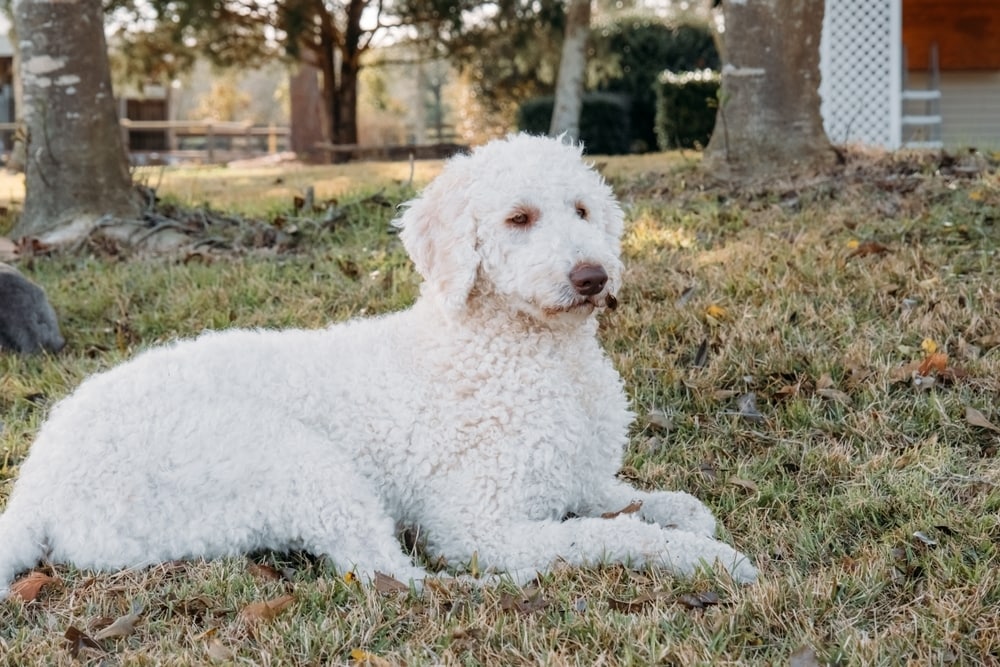- October 11, 2023
White Goldendoodle: Pictures, Facts & History


Goldendoodles have really taken the limelight in the hybrid dog world. This designer breed is a favorite of canine lovers everywhere. You probably see them all over the place— walking down the street, playing at dog parks, and cheerfully peering over a fence in someone’s yard.
They have gained popularity due to their less allergenic coats and amiable characters. While they come in many coat colors, the white form might have caught your eye. We agree these are beautiful animals. Here, we’ll learn a little more about the breed’s history.
Breed Overview
Suitable for:
Active families, children 6+, service and therapy, some allergy suffers
Temperament:
Affectionate, high energy, loyal, intelligent
A Goldendoodle is a hybrid between a Golden Retriever and a Poodle. These are two trendy and intelligent dogs that are used for a variety of emotional, utility, and service purposes. Combining the two gives you a more allergy-friendly, interesting-looking pup.
It’s no wonder that they are a favorite everywhere. The white Goldendoodle is simply a coat color variation. Nothing about the personality or physical makeup of the Goldendoodle changes based on coat color.
Goldendoodle Characteristics
Energy:
+
High-energy dogs will need a lot of mental and physical stimulation to stay happy and healthy, while low-energy dogs require minimal physical activity. It’s important when choosing a dog to make sure their energy levels match your lifestyle or vice versa.
Trainability:
+
Easy-to-train dogs are more skilled at learning prompts and actions quickly with minimal training. Dogs that are harder to train will require a bit more patience and practice.
Health:
+
Some dog breeds are prone to certain genetic health problems, and some more than others. This doesn’t mean that every dog will have these issues, but they have an increased risk, so it’s important to understand and prepare for any additional needs they may require.
Lifespan:
+
Some breeds, due to their size or their breeds potential genetic health issues, have shorter lifespans than others. Proper exercise, nutrition, and hygiene also play an important role in the lifespan of your pet.
Sociability:
+
Some dog breeds are more social than others, both towards humans and other dogs. More social dogs have a tendency to run up to strangers for pets and scratches, while less social dogs shy away and are more cautious, even potentially aggressive. No matter the breed, it’s important to socialize your dog and expose them to lots of different situations.

The Earliest Records of White Goldendoodles in History
The Goldendoodle was first created in 1969, but the breed started rapidly developing in the mid-1990s. Since white is one of the most popular official Poodle colors, it’s no wonder they show up in Goldendoodle litters so often. The rarity of the white color will depend on the generation of the Goldendoodle, and prices might reflect that.
How White Goldendoodles Gained Popularity
The Goldendoodle became attractive to many canine lovers for a variety of reasons. Breeders love the endless possibilities of appearance and overall temperament. These dogs fit growing families, as they have agreeable and loving temperaments with ideal energy levels.
Goldendoodles also became popular because they shed less than traditional canines. Many mild to moderate allergy sufferers can have Goldendoodles with little to no irritation. While there might have been some confusion about this at first, many are now learning about generations.
Certain Goldendoodle generations are less likely to shed than others. Often, Goldendoodles with more of the Poodle influence will carry this non-shedding characteristic.
Formal Recognition of White Goldendoodles
Since a Goldendoodle is a hybrid breed, technically a mixed breed, they are not formally recognized by the AKC. However, Goldendoodles are recognized by their very own association—the Goldendoodle Association of North America (GANA).
GANA is a nonprofit organization that was established in 2009. The entire goal of this association is to put official guidelines in place for breeders to develop this hybrid to the best of their ability. They focus on overall structure, temperament, health, and coat.
White is a coat color found in all accepted Goldendoodle varieties.

Top 6 Unique Facts About Goldendoodles
If you love the white Goldendoodle due to its snowy and beautiful appearance, you might want to know more about what it’s like to own one. Here are some fun facts every Goldendoodle lover should know.
1. Goldendoodles Are Ideal Family Companions
Goldendoodles can make wonderfully charming additions to many families. Because of their lineage, they combine two notoriously good dogs with growing children and adults alike.
Since they have such high energy levels, they often make extremely good playmates for kids as they tend to be gentle while still being very playful. They also are conscious enough to understand limitations, even if they can be a little stubborn or difficult to train initially.
Because of their strong bonds with people, they can also make extremely good emotional support or service animals.
2. No Goldendoodle Is Truly Hypoallergenic
Contrary to popular marketing, this breed is not truly hypoallergenic. In fact, many Goldendoodles still shed quite profusely. So what is up with the false proclamation? Goldendoodles are far more hypoallergenic than some other breeds.
However, this is not always true. Having a dog that sheds less can alleviate much suffering for mild allergy sufferers. You have to keep in mind that Goldendoodles are a mix of two parent breeds.
While Poodles are classically “hypoallergenic” dogs, Golden Retrievers are far from it. In fact, Golden Retrievers shed year around and can cause quite a few problems for those with sensitivities.
Breeding practices are still trying to perfect the breed; different generations of Goldendoodles can provoke various allergic responses, depending on their lineage and which parent they take after.
So you should never buy a Goldendoodle presuming that it won’t affect someone in the house with allergies. This is often misleading and can cause unnecessary rehoming for innocent pups at no fault of their own.
3. Goldendoodles Have Multiple Generations
You might think that the Goldendoodle is one size fits all. However, they have multiple generations, each with their own genetic twists.
Here they are:
- F1—First Generation (Golden Retriever x Poodle)
- F1b—First Generation Backcross (hybrid x purebred parent)
- F2—Second Generation (F1 x F1)
- F2b—Second Generation Backcross (F1 x F1b)
- F3 and Multigenerational (any other generation cross)
Having these multi-generations will take specific physical and mental traits from each parent, achieving different results.
4. Goldendoodles Come in Different Sizes
Goldendoodles come in three different sizes, thanks to the Poodle influence. You could have a miniature, standard, or large. Each one of them varies in height and weight.
- Miniature Goldendoodle—13–17 inches/15–40 pounds
- Standard Goldendoodle—17–20 inches/40–50 pounds
- Large Goldendoodle—20–24 inches/50–90 pounds
If you prefer one particular size over another, pick the right breeder. Some of them offer puppies of all of these variations, while others specialize in a specific size.
5. Goldendoodles Come in Many Other Colors
We know you’re a fan of the white Goldendoodle! But that’s not the only colors that exist. There are several that are pretty common and others that are rare.
Here is the full spectrum:
- Red
- Apricot
- Chocolate
- Black
- Cream
- Silver
- Sable

6. Goldendoodles Can Have Digestive Problems
People might rave about Goldendoodles, as they are very attractive to potential owners for various reasons. However, we would be remiss if we didn’t mention the downfalls. One of which is that Goldendoodles have a problem with their digestive systems.
Not all of them will be affected, but the Poodle parent is known for their sensitive stomachs and potential allergies. These health issues can extend to the Goldendoodle puppy, resulting in food sensitivities, high vet bills, and hard-to-diagnose intestinal problems.
Plus, Goldendoodles are big chewers, putting them at increased risk of having an intestinal blockage.

Does a Goldendoodle Make a Good Pet?
Goldendoodles make terrific pets for the right families. However, they make potentially incompatible companions for some. Let’s touch on some of the positives first!

Conclusion
If a white Goldendoodle sounds perfect for your home—it’s time to start the puppy search! Bringing home a new dog can be so exciting! We hope you’ve learned quite a lot about the history of the breed.
The Goldendoodle is evolving over time, becoming even more solidified in its own right. While they are not accepted by any major breeder associations yet, their popularity seems ever flourishing.
Featured Image Credit: Maria Surtu, Shutterstock
Tags
What do you think?
Related Articles

New Puppy Checklist: Gear You’ll Need for Your New Dog
Getting a new puppy is really exciting, but before you welcome them home, it’s important to prepare your space for them. Since puppies need a

How Big Do Mini Poodles Get? Vet Reviewed Average Weight & Growth Chart – Dogster
The information is current and up-to-date in accordance with the latest veterinarian research. Learn more » When you buy a Miniature Poodle, you might not

Can Police Dogs Smell Nicotine? Vet Verified Facts & Info – Dogster
The information is current and up-to-date in accordance with the latest veterinarian research. Learn more » While cigarette sales have been declining steadily for decades,

How Old Is 5 in Dog Years? Vet-Approved Guide to Each Size of Dog – Dogster
The information is current and up-to-date in accordance with the latest veterinarian research. Learn more » A common method for calculating a dog’s age is

